“I think the biggest pitfall about learning the blues is faking it”: Slash talks true blues, his love for the pedal steel and valuable advice for new players
Switching out his fabled Les Paul for an ES-335 and his Marshall for Magnatones, Slash goes all in on the blues for Orgy Of The Damned – and lifts the lid on the gear that powered the album
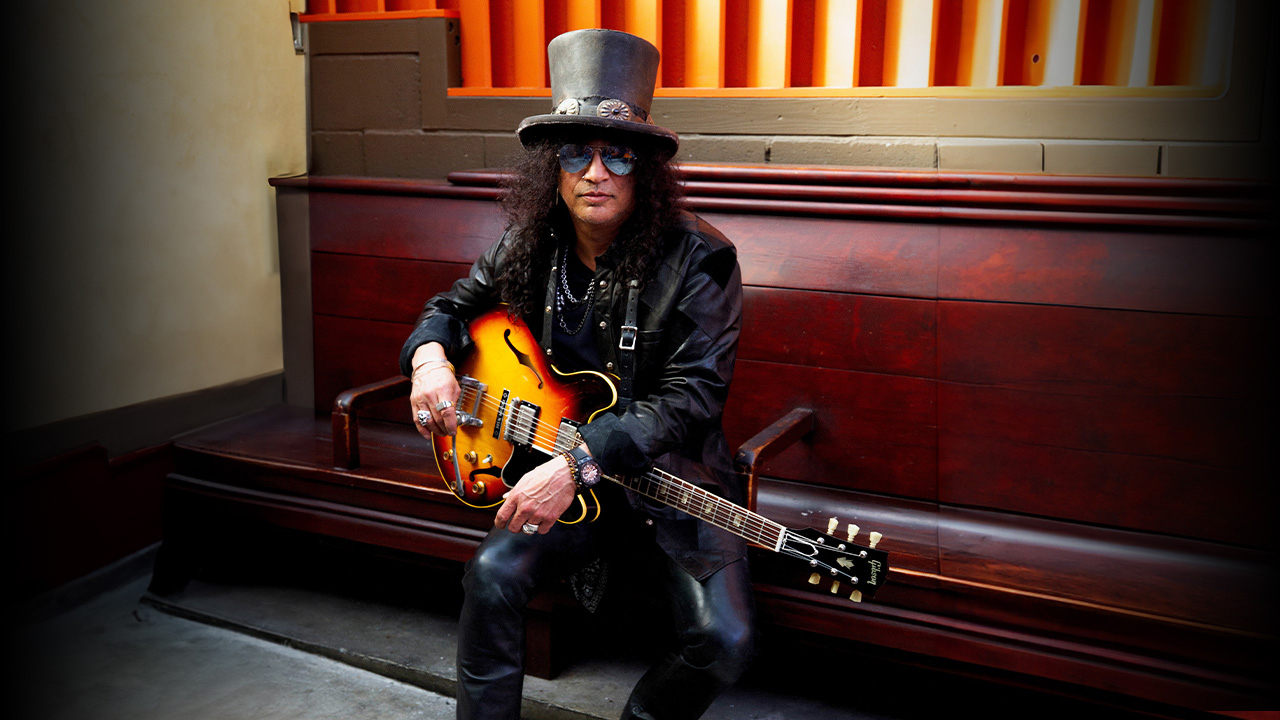
It could be argued that Slash is the most recognisable man in rock. There's certainly not another musician who could be as easily picked out of a lineup on the strength of their silhouette alone. Putting the top hat, Aviators, and leather trousers aside for a moment, perhaps more recognisable than his trademark look is his devilishly good playing. Slash is a guitar icon and his emblematic double stops and hypnotic harmonic minor runs will cement the Guns N’ Roses axeman in the annals of rock history as one of the best to ever do it.
Now, while Slash may never be too far away from a Gibson Les Paul and Marshall stack at any given moment, it’s fair to say that he’s always been a blues lover at heart – and that’s never been more evident than on his latest album, Orgy Of The Damned. Much like his first solo release, Slash has assembled a star-studded cast of the world’s top musicians and a revolving door of talented singers – including Demi Lovato, Paul Rodgers and Chris Stapleton, delivering an album that’s choc-full of serious guitar statements. Unlike 2010’s self-titled release, Orgy Of The Damned features only one original composition, with the rest of the record being made up of takes on well-known blues staples.
We caught up with Slash via video call to discuss the new album, and he informed us that he was looking to go in a slightly different direction this time around. “I went into this record with a little bit of a different approach, knowing that it was going to be a little bit more laid-back, and I wasn't going to bring Marshall Stacks in and all that,” he reveals. “But, other than that, I just sort of do what I do. My approach to stuff is always more or less the same. You know, I just sort of do it.”
I wanted a different kind of sound, so I changed some of my gear around
However, he does admit that he was looking to change things up sonically for this go-around, switching out his wall of Marshalls for Magnatones and reaching for a vintage ES-335 when the song called for it.
“I wanted a different kind of sound, so I changed some of my gear around. And I think that was really the main thing. I took a bunch of combos into the rehearsal studio when we first started thinking about [making the record]. I've got Fenders, I've got a Vox, Magnatone and some other odds and ends. I tried everything, trial and error,” he admits. “I ended up on the magnetone for the whole thing – I recorded the full record with the magnetone. That's really been sort of like the sound that I've been digging for this. I even used it on the last Guns N’ Roses tour. I swapped out my Marshalls. I was looking for a little bit more of a clean, kind of raunchy, just old-school rock ‘n’ roll sound.”

Now, if you’re hoping to harness this new Slash tone for yourself, you’re in luck, as he recently released a limited edition signature series with the Missouri-based amp makers. “I've been working on a 100-watt Magnetone, which sounds really great,” discloses Slash. I've been using it with the Conspirators.”
“Then with guitars, I was still using Les Pauls but I used a couple of different guitars that I don't use all the time with the Conspirators or with Guns N’ Roses.” The main six-string that seemed to get the most airtime on this new record was his newly acquired ‘63 Gibson ES-335, a guitar that Slash praises for its articulate tone.
Get the MusicRadar Newsletter
Want all the hottest music and gear news, reviews, deals, features and more, direct to your inbox? Sign up here.
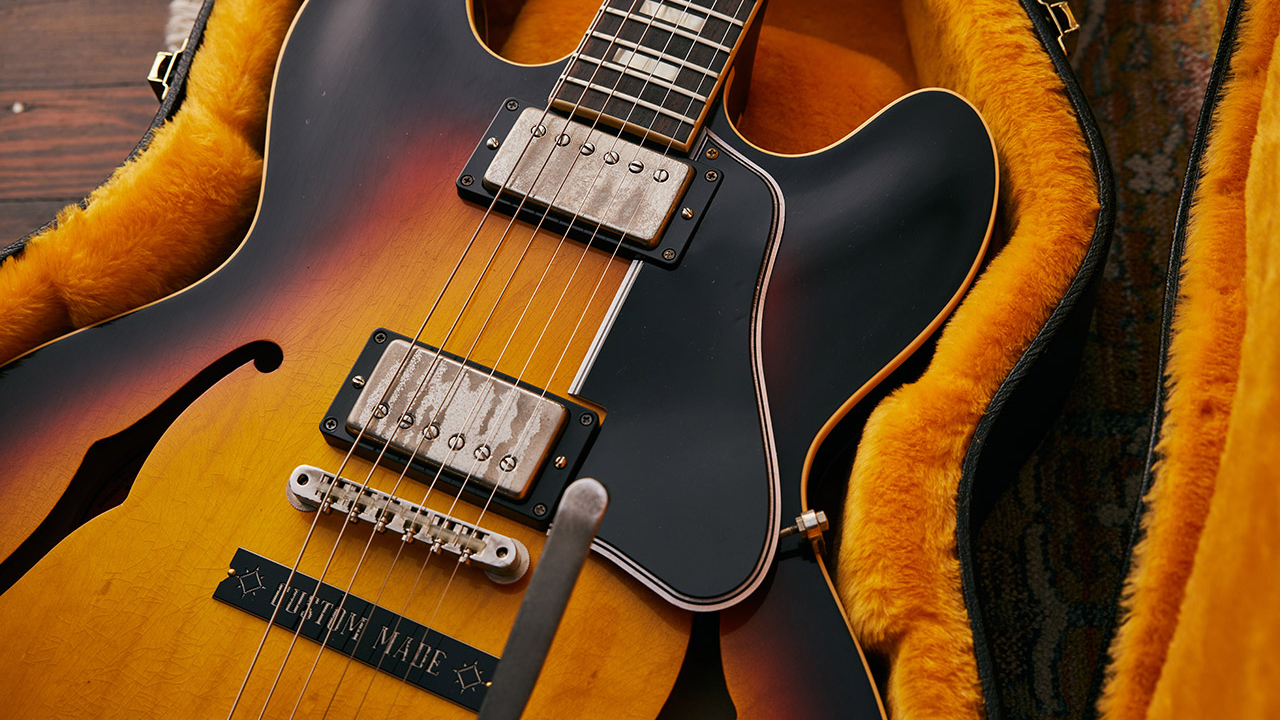
I have to say, they made a really great replica of that ‘63
“I had just picked one up before we actually started making this record. I think it was a ‘63 that I picked up and it just sounded great. It's got humbuckers in it, so it's got the characteristics of a Les Paul as far as having a certain weight to it sound-wise, but it's also got a certain clarity to it. The strings when you're doing chords really ring out individually, and for solos, it's got a nice pop to it, and it's a little cleaner,” enthuses Slash.
In fact, Slash loved this guitar so much that he had the team over at the Gibson Custom Shop make an expertly crafted replica in the form of a Collector’s Choice run that was limited to just 50 pieces. When pressed to see if we could expect a USA version or even an Epiphone anytime soon, Slash wasn’t giving anything away – although, he did inform us that the replica actually beat out the original while he was taping his recent live performance for Jimmy Kimmel Live.
“I don't know at this point. That happened very quickly. I heard yesterday that all of them sold out in record time, which I was like, ‘Wow, really?’ I have one of these new ones, and I took both the old one and the new one to the taping of a TV show in Los Angeles. I was playing with the house band on a talk show, and I used both guitars, but I ended up just using the new one because it sounded really good. So I used that for the whole three days. I have to say, they made a really great replica of that ‘63.” High praise for the Gibson Custom Shop, indeed.
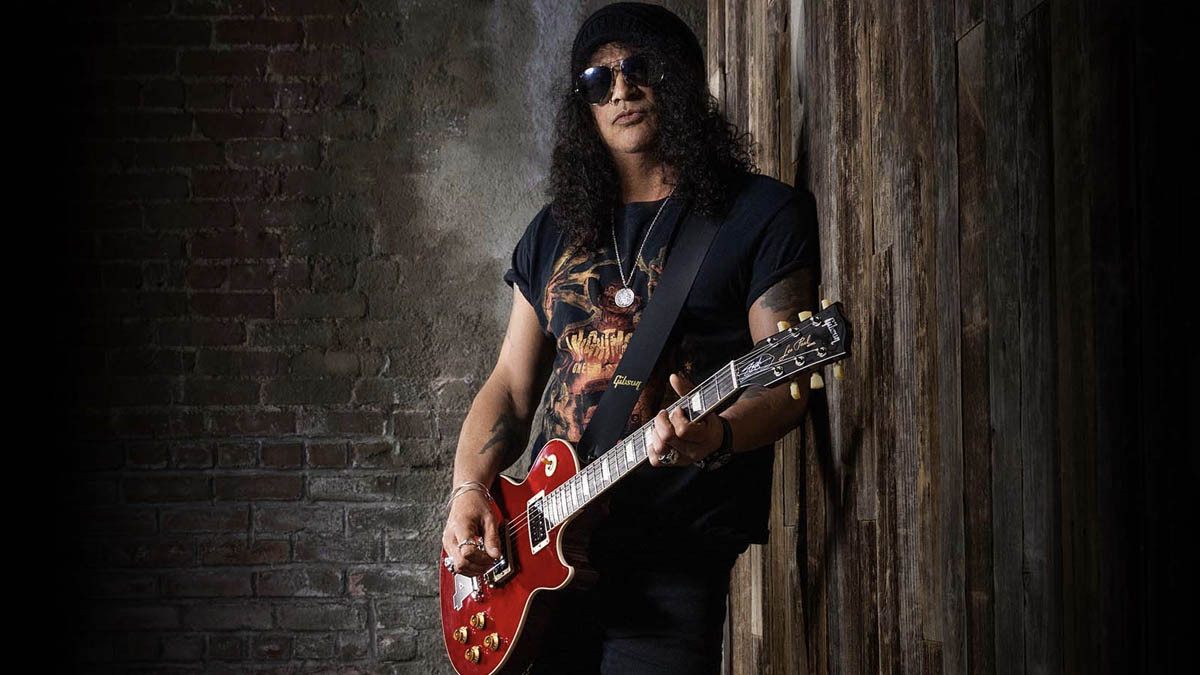
Now, despite being such a massive part of most guitarists' remit, the blues can come across as inauthentic when not played with the right attitude — which certainly isn’t the case on Orgy Of The Damned. So, with that in mind, we felt it would be a good idea to ask Slash if he had any advice for players new to the blues that would help them sound more authentic and possibly eliminate dreaded imposter syndrome.
I identified with them when I started playing guitar wholeheartedly
“Well, the way that it started for me, as far as the blues was concerned, I really didn't know that much about it until my grandmother played me B.B. King when I was like seven years old,” he reminisces. “His style really spoke to me even then, and I had no aspirations to play guitar, but I just liked the way it sounded. My grandmother turned me on to BB King because I came back from the UK with all this British rock ‘n’ roll stuff, and she was like, ‘Well, you know where those guys got it?’ Because my grandmother's American, my dad's British. So my dad turned me on to all this great sort of ‘60s and very early ‘70s British rock ‘n’ roll. And when I came to the States, my grandmother was like, ‘Well, you know where those guys got it?’ She played me BB King and that started a whole relationship with the blues.”
“Now, for somebody who's picking up the guitar right now, you just have to go back and listen to a lot of old blues artists and see what appeals to you. There's a lot of different guys, and they all have different styles, but you know, all things considered, they're all great, and you just find one that you really [connect with].
“BB [King] was a big one for me and then there was Freddie King and Albert King – the King guys were great. I identified with them when I started playing guitar wholeheartedly. So that's really what you do – just start listening.”
Slash continues to say that blues isn’t really something that is taught but more something you feel. The key to being a true masterful blues player is to tap into the emotion of the music and let it flow through your fingers.
“It really is a feel thing. If it really speaks to you on an emotional level, pulls at your heartstrings, or really just moves you, then it shouldn't be hard to have your own interpretation of it, you know, because it flows through you. It's something that you just feel. I think the biggest pitfall about learning the blues is faking it. Knowing the notes is simple enough but then playing them without any kind of real emotional commitment [is where some players go wrong].
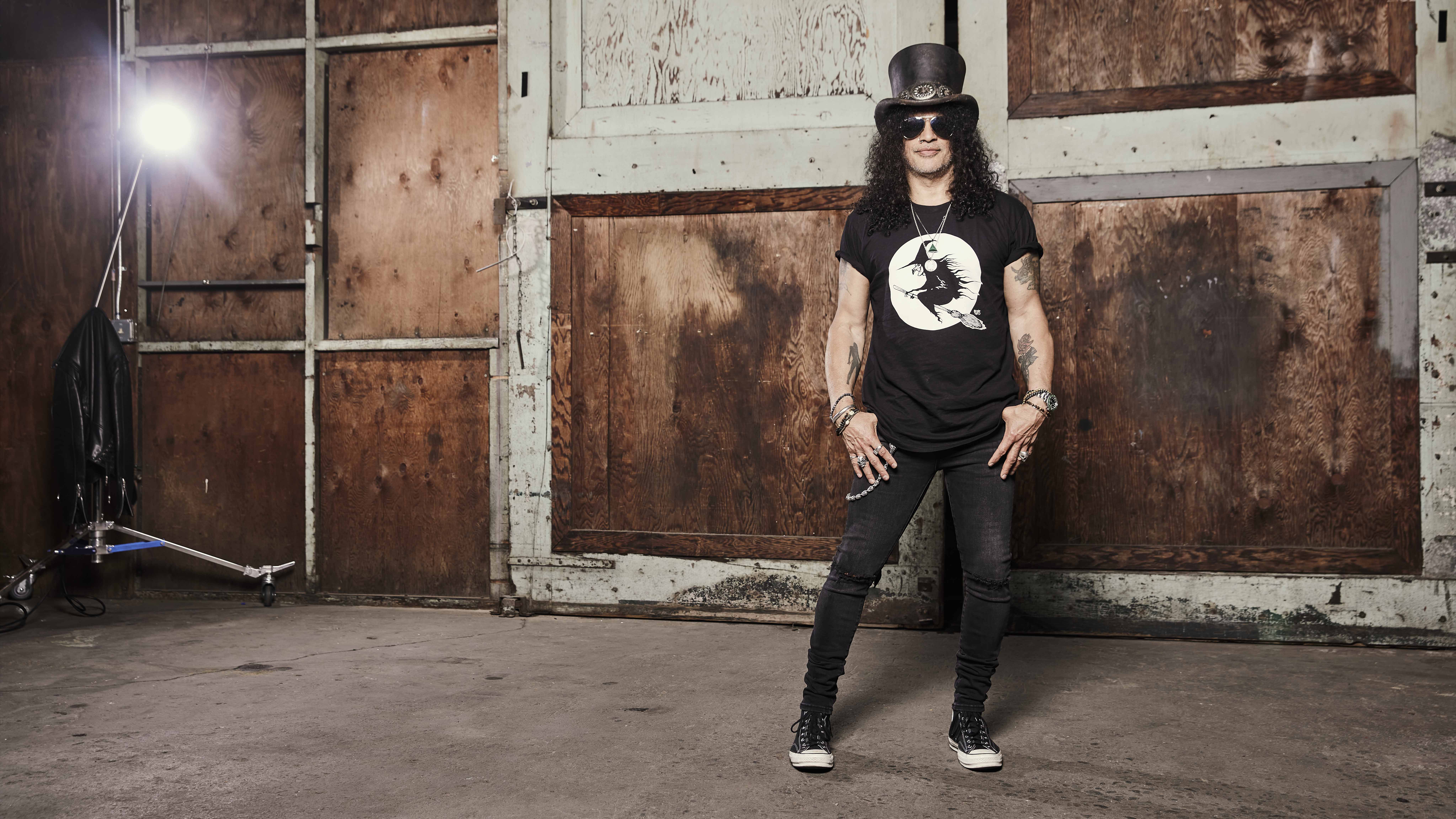
Slash shares his 7 tips for recording live: “Being in a rock ’n’ roll band is to be able to go in and be as good as any of those people that didn’t have the luxuries of what we have today"
“You can talk about it but it's not something you can really teach anybody,” says Slash, “It's something that you just sort of have to do and see how it goes. I remember when I first could put four notes together on a guitar. I arrived at what you basically now call a pentatonic scale. I arrived at a melody using the notes from that scale, not knowing the scale at the time. Just the succession of notes was like a eureka moment. It was like the heavens parted and it [gave me] goosebumps. I was like, ‘Oh my god!’ – it definitely touched me.
“It really goes for almost any kind of music. I mean, when it comes down to it, blues, jazz, rock ‘n’ roll, and all that, even classical music, it all should affect you when you play it or when you hear it. That's really what you're trying to do – achieve what you feel when you listen to stuff and be able to do it when you're playing.”
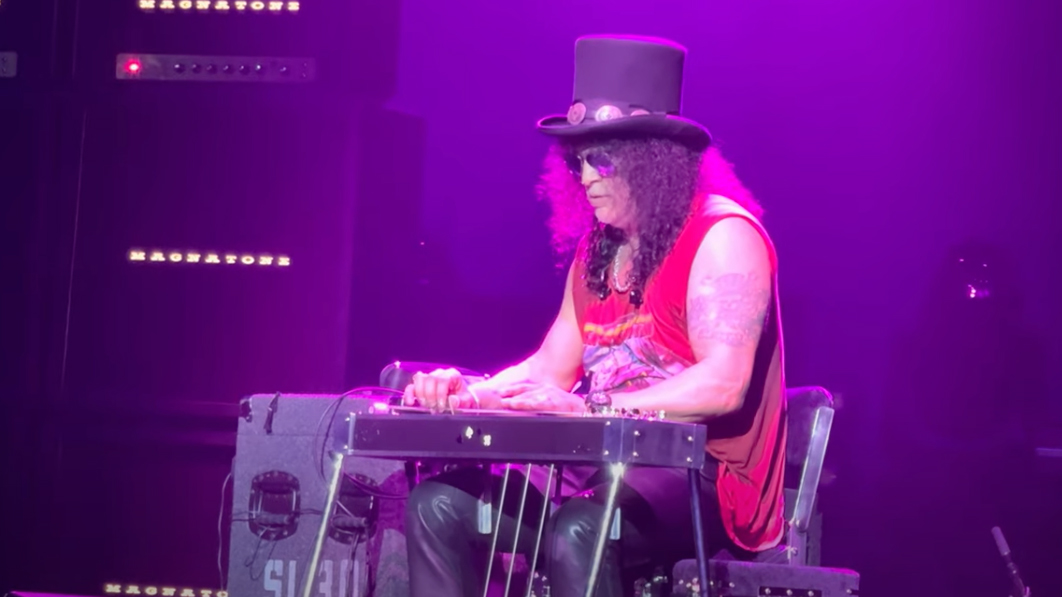
Moving on from the topic of Orgy Of The Damned and eagled-eyed fans who were lucky enough to see Slash perform with Myles Kennedy and the Conspirators on their Rest Of The World tour will have seen that GnR’s shredder-in-chief has a new love in his life, the pedal steel.
I've been at it for two years, and I've only scratched the surface with this thing, but I f**king love it. It's a great instrument
While he may still be fairly new to the instrument, an excited Slash discloses his love of the country staple but admits that learning it has been tricky. However, he is persevering with it and even incorporating it into his live show.
"I've only been playing it for a short time," he tells us, "So it was really sort of flying by the seat of your pants to put it into the set. But I made myself do it because I wanted to get better at it. It's something that you have to practice all the f**king time.
“There are so many nuances to it,” he continues. "I commit at least two to three hours a day, no matter what, to playing the pedal steel. I started after the last Conspirators' tour. So that was in 2022. I've been at it for two years, and I've only scratched the surface with this thing, but I f**king love it. It's a great instrument."
Despite his affection for the instrument, fans shouldn't hold out hope for a country album anytime soon. That said, there is a chance his beloved Jackson model will make an appearance on future tracks and at live shows.
“I don't have any professional aspirations for it, really. It's not something I'm doing because I want to put out a pedal steel record. It's just really for my own personal enjoyment. I don't know how many songs or what songs I could actually put it in, you know?
“I love country music,” admits Slash “but I don't necessarily [like] all country songs or country singers especially, but I love the musicians, they are great. And I love steel guitar playing in that capacity. I also love where you can put it where it doesn't sound like country – in other contexts. And I think that's where I'm headed with it.”
Slash may have only recently committed to learning the instrument, but his infatuation with pedal steel goes back to making his first solo record and a chance encounter with a model guitarist Jeff Baxter let him borrow, albeit very briefly.
“I picked it up because I love the harp, you know, the stand-up harp. That involves foot pedals and chord grips and all that. This is going to sound crazy, but at some point in like 2009, Jeff Baxter came down to where I was doing the first recording of ideas for the first solo record. When I was first putting the songs together, Jeff came down to the studio and he brought a pedal steel to show me. And I was like, ‘This is a lot like the harp in its own way.’
“I was really into it, but it was so complex that I was like, ‘I don't have time to even start trying to learn how to do this’. He showed me some stuff, and I was like, ‘Oh, this is great,’ but then he said, ‘I'm gonna have to pick it up tomorrow,’ I said, ‘Tomorrow!’ 24 hours was not enough time for this thing. So he took it and it was always in the back of my mind."
I locked myself up in my studio and started finding all these books to learn how to play it
“Then Conspirators were recording the Four record in Nashville. There's something about Nashville, if you're recording [there], it really gets into your soul. So I was reading some books about different Nashville artists, and Lloyd Green was mentioned, he was a paramount country pedal steel guy from the ‘60s. Basically made his bones in the ‘60s. I was reading about him and I just got really fascinated about the pedal steel. So fast forward to when I got back from recording the record and the Conspirators were about to go on tour, I got this wild [idea] to buy a pedal steel and I locked myself up in my studio and started finding all these books to learn how to play it.”
Now, it’s fair to say that Slash has amassed a rather large collection of guitars over his four-decade-strong career, but it looks like he has started adding a slew of pedal steels to his arsenal.
“The one that I'm playing live is a Jackson. Back in the day, there was a company called Sho-Bud, which was Shot Jackson and Buddy Emmons' company that made really great pedal steels back in the ‘60s,” Slash informs us. “Shot Jackson and Buddy Emmons split up, and so Shot Jackson's family went on to do the Jackson pedal steel, and Robert Randolph, who's obviously an amazing steel and lap steel player, he turned me on to Jackson, and so they sold me the one that you saw me playing [in concert].
“They just made me a new one which I haven't seen yet. I'm gonna see it tomorrow. So that's what I've been playing, but I also have a Williams at home. I have a bunch of different ones. I'm a guitar nut, so I have a new thing to go out and collect [laughs].”
Slash admits that they aren’t as easy to get a hold of as his beloved Les Pauls, and he prefers newer models, as unlike vintage guitars, pedal steels can start to have issues the older they get.
“They're not as commonplace and they're definitely more complicated to lug around but there's a bunch of different really great brands,” says Slash. “I've collected at least one or two of every one of those brands, just because, but the Jackson is great. It sounds really good and it's very simple – and it's new. That's the thing about pedal steels, they don't age well like guitars.”
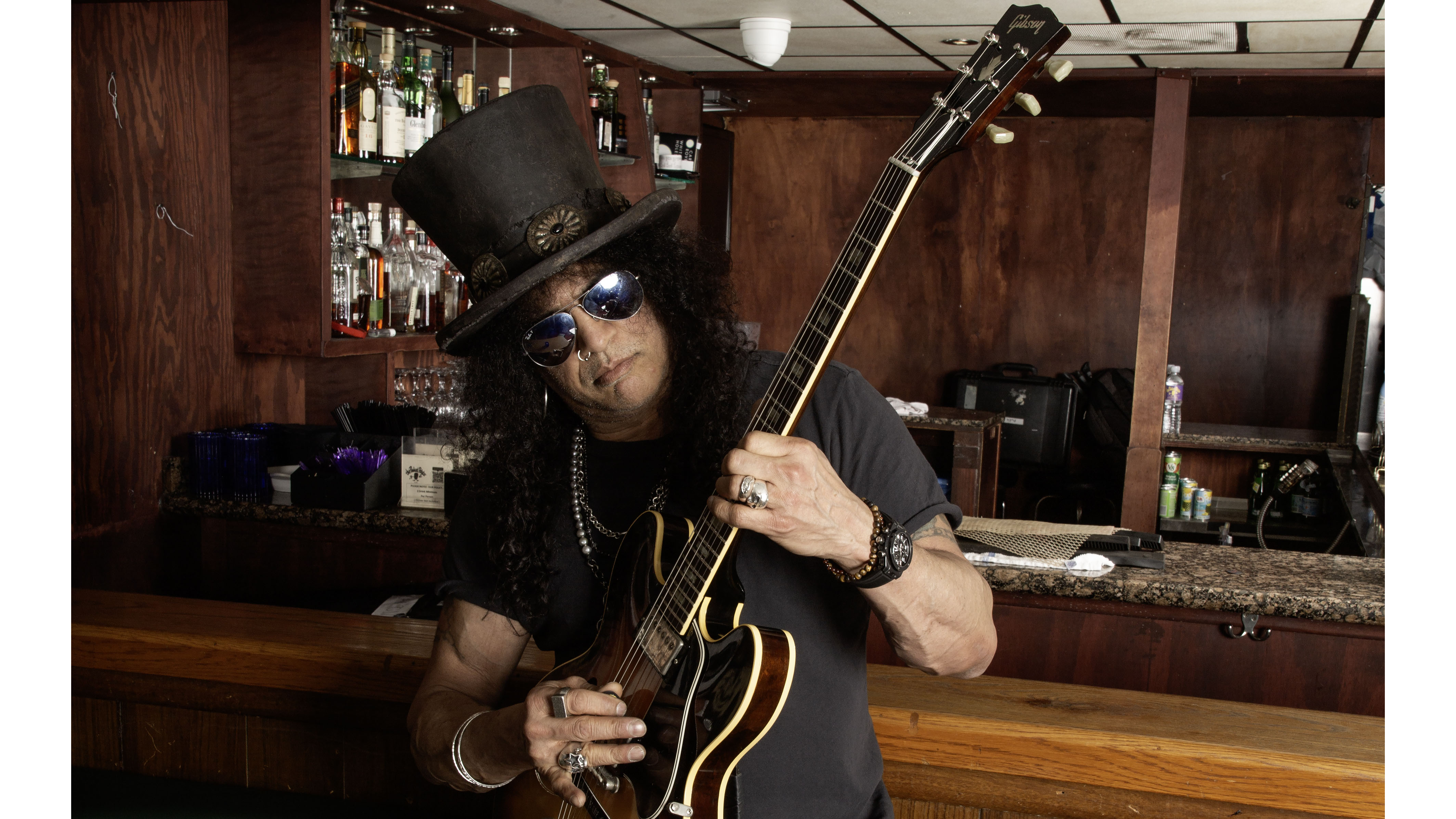
Slash’s new album Orgy Of The Damned is out now and you can catch Slash and his touring blues festival S.E.R.P.E.N.T. around North America this summer, kicking off on July 5 at the KettleHouse Amphitheater in Bonner, MT and wrapping up at the Texas Trust CU Theatre in Grand Prairie, TX, on August 17.
Don’t worry, fans based in the UK and Europe, as Slash has hinted that the festival may make its way across the pond, saying, “If it goes well, then I definitely want to bring it to Europe, but I think the US is sort of the trial run, see how that all works. In Europe, there's nothing really like it that’s touring through the continent. So I definitely want to do that.”
You can see a full list of US tour dates below.
- Jul 05: Bonner KettleHouse Amphitheater, MT
- Jul 06: Airway Heights Northern Quest Amphitheater, WA
- Jul 08: Redmond Marymoor Park, WA
- Jul 10: Bend Hayden Homes Amphitheater, OR
- Jul 12: Lincoln Thunder Valley Casino, CA
- Jul 13: Los Angeles Greek Theatre, CA
- Jul 14: Tucson Anselmo Valencia Amphitheater, AZ
- Jul 17: Denver The Mission Ballroom, CO
- Jul 19: La Vista The Astro Amphitheater, NE
- Jul 21: Terre Haute The Mill, IN
- Jul 22: Cincinnati PNC Pavilion at Riverbend, OH
- Jul 24: Interlochen Interlochen Center for the Arts, MI
- Jul 25: Huber Heights Rose Music Center, OH
- Jul 27: Windsor The Colosseum at Caesars, ON, Canada
- Jul 28: Toronto Budweiser Stage , ON, Canada
- Jul 30: Lewiston Artpark Outdoor Amphitheater, NY
- Aug 01: Boston Leader Bank Pavilion, MA
- Aug 04: New York Pier 17, NY
- Aug 05: Bethlehem Musikfest, PA
- Aug 07: Cary Koka Booth Amphitheatre, NC
- Aug 08: Atlanta Cadence Bank Amphitheatre at Chastain Park, GA
- Aug 10: Clearwater The Sound at Coachman Park, FL
- Aug 11: St. Augustine Amphitheatre, FL
- Aug 13: Huntsville The Orion Amphitheater, AL
- Aug 14: Franklin FirstBank Amphitheater, TN
- Aug 16: Bentonville The Momentary, AR
- Aug 17: Grand Prairie Texas Trust CU Theatre, TX
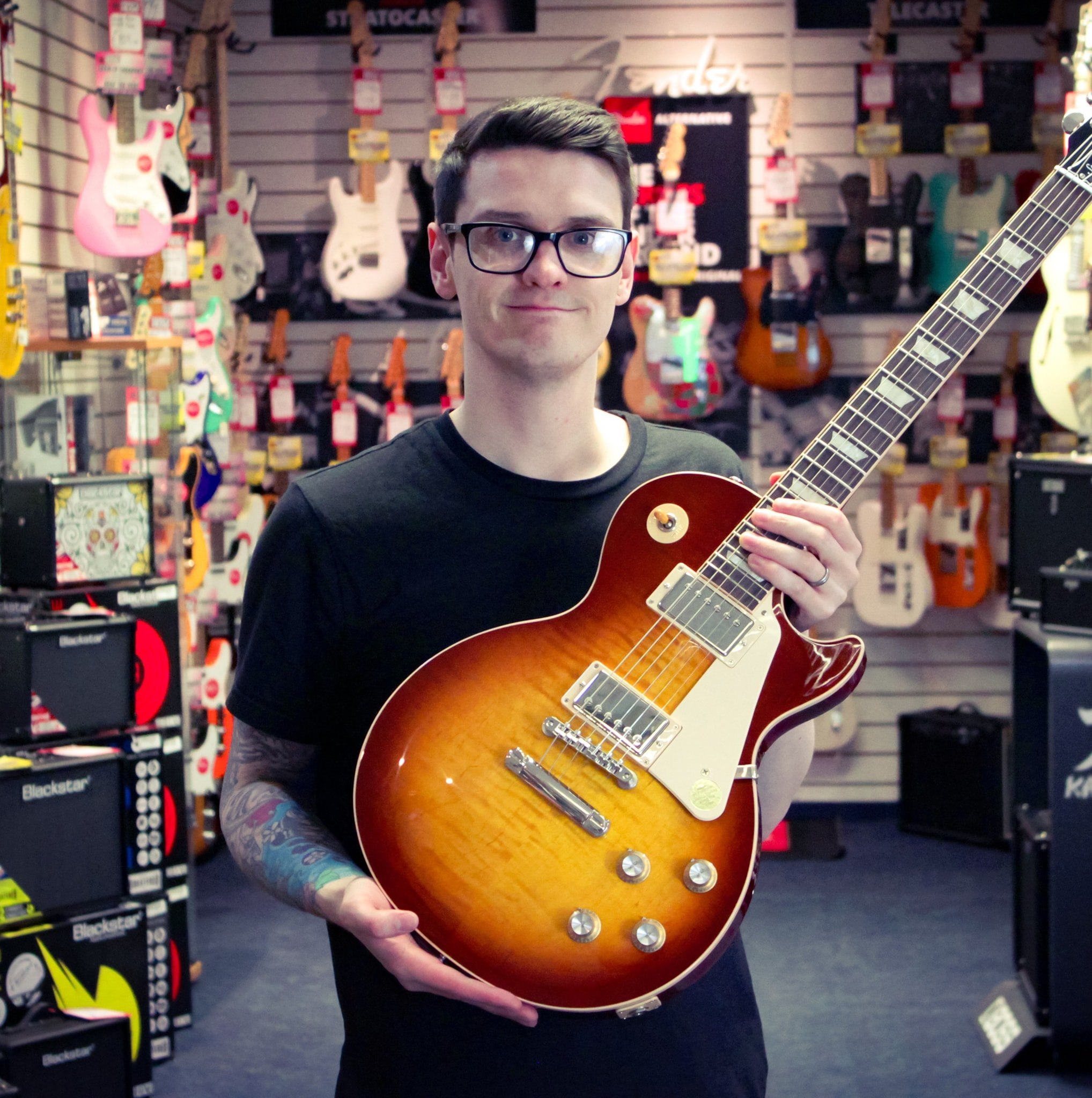
I'm a Senior Deals Writer at MusicRadar, and I'm responsible for writing and maintaining buyer's guides on the site - but that's not all I do. As part of my role, I also scour the internet for the best deals I can find on gear and get hands-on with the products for reviews. My gear reviews have been published in prominent publications, including Total Guitar and Future Music magazine, as well as Guitar World.com. I've also had the privilege of interviewing everyone from Slash to Yungblud, as well as members of Sum 41, Foo Fighters, The Offspring, Fever 333 and many more.
I have a massive passion for anything that makes a sound, particularly guitars, pianos, and recording equipment. In a previous life, I worked in music retail, giving advice on all aspects of music creation and selling everything from digital pianos to electric guitars, entire PA systems, and ukuleles. I'm also a fully qualified sound engineer who holds a first-class Bachelor's degree in Creative Sound Production from the University of Abertay and I have plenty of experience working in various venues around Scotland.
“Every note counts and fits perfectly”: Kirk Hammett names his best Metallica solo – and no, it’s not One or Master Of Puppets
“I can write anything... Just tell me what you want. You want death metal in C? Okay, here it is. A little country and western? Reggae, blues, whatever”: Yngwie Malmsteen on classical epiphanies, modern art and why he embraces the cliff edge









